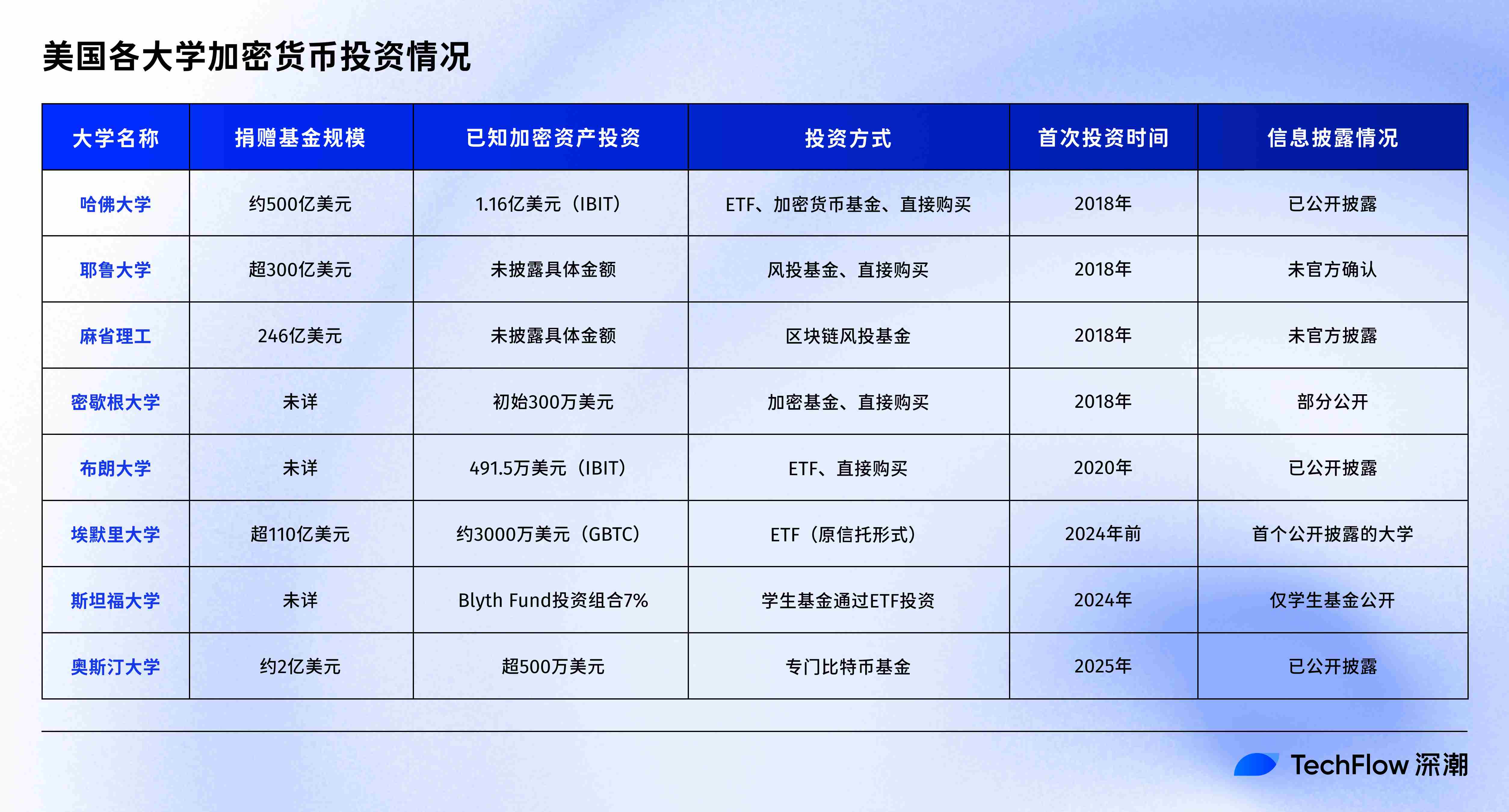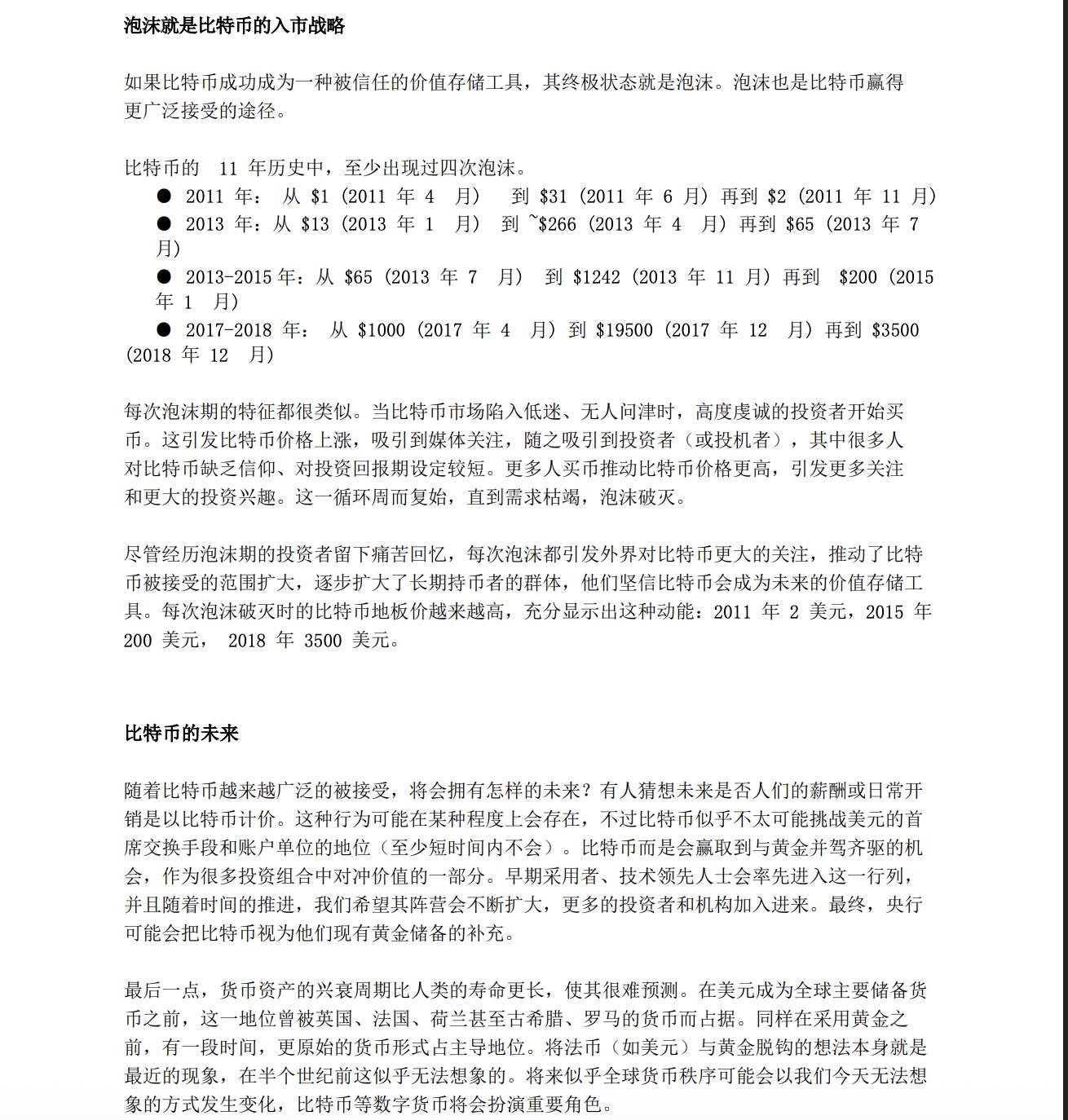In August 2025, Bitcoin's price crossed $120,000, pushing the once "fringe asset" back into the mainstream spotlight, driven not only by Wall Street hedge funds but also by the most conservative and shrewd fund managers from Ivy League campuses.
On August 9th, the SEC's 13F filing revealed a detail that caught the market's attention: **Harvard University's endowment fund (with approximately $53.2 billion in assets) held $116 million worth of Bitcoin ETF (IBIT) in the second quarter of 2025.** This position ranked fifth in its portfolio, behind Microsoft, Amazon, Booking Holdings, and Meta, even surpassing the allocation of Alphabet and Nvidia.
Harvard is not an isolated case.
Brown University, Emory University, and the University of Austin have also publicly disclosed cryptocurrency positions.

These "misers" in the ivory towers are not impulsively embracing cryptocurrency, but rather seeing the surface of a long-term strategy.
The capital, talent, and technology of these prestigious schools have long been deeply rooted in the crypto industry.
This time, they have been pushed to the forefront.
Investing in Crypto During the Bubble Burst
2018 was the darkest moment for the cryptocurrency industry.
With the ICO bubble bursting, global crypto asset market value evaporated by over $630 billion, dropping to less than $200 billion, Bitcoin fell to $3,000, Ethereum to $80, retail investors fled, and cryptocurrency was labeled a "Ponzi scheme", with Facebook even banning crypto-related advertisements.
At this moment when everyone was avoiding crypto, Yale University's endowment fund made a decision that seemed to "go against tradition".
Under the leadership of legendary investor David Swensen, in October 2018, Yale University, along with Harvard, Stanford, and other top institutions, invested in Paradigm's first $450 million crypto fund, founded by Coinbase co-founder Fred Ehrsam and former Sequoia Capital partner Matt Huang. Simultaneously, Yale also participated in a16z's first $400 million crypto fund.
In hindsight, this investment during the industry's low point not only influenced Paradigm and a16z's development trajectory but also, to some extent, accelerated the historical process of the crypto industry.
Originally planned to invest 60% in crypto assets and 40% in crypto startup equity, Paradigm chose a bold move—using the trading platform Tagomi to buy the dips on Bitcoin and Ethereum, with a Bitcoin entry cost of around $4,000. Just months later, in the first half of 2019, Bitcoin's price briefly exceeded $10,000.
For university endowment funds, unable to directly purchase Bitcoin and lacking compliant ETF products, having Paradigm hold crypto assets was a "roundabout entry" strategy, allowing the foundation to isolate risks at the compliance and responsibility levels even if losses occurred.
How Matt Huang convinced the Yale fund to invest in a newly established crypto fund remains somewhat of a mystery.
Although Matt Huang's mother Marina Chen was a computer science professor at Yale University, there is no information suggesting she influenced Yale's investment in Paradigm.
Through Matt Huang's 2020 article "Preaching Bitcoin to Open-Minded Skeptics", we might glimpse how he persuaded investment heads of various university funds.
Matt Huang believed that bubbles are not flaws but necessary paths for Bitcoin's broader acceptance, with each bubble expanding Bitcoin's awareness and acceptance. Bitcoin won't challenge the dollar's medium of exchange status in the short term but will eventually stand alongside gold as a portfolio hedge tool, held by institutional investors, until central banks potentially adopt Bitcoin as a reserve.

Stanford leverages its Silicon Valley heart position, with enormous influence in the crypto industry, nurturing star project founders like OpenSea, Alchemy, Filecoin, Story, and industry leaders such as Solana Foundation Chairman Lily Liu.
At Stanford University's blockchain conference in 2019, star sponsors were gathered, with renowned projects and institutions like Ethereum, Cosmos, and Polychain prominently featured, seemingly poised to surpass many large crypto conferences.

MIT excels in technical research. The Digital Currency Initiative team participated in Zcash's R&D, which was selected by MIT as one of the top ten breakthrough technologies in 2018, after all, the zero-knowledge proof (ZK) milestone cryptography technology was proposed by MIT researchers in the 1980s.
MIT Professor and Turing Award winner Silvio Micali personally stepped in, creating the high-performance public chain Algorand in 2017.
MIT alumni roster reads like a "crypto star directory": Paradigm founder Matt Huang, MicroStrategy founder Michael Saylor, StarkWare co-founder Uri Kolodny, Litecoin founder Charlie Lee, and FTX founder SBF all emerged from MIT.
UCB (University of California, Berkeley) is extremely active in entrepreneurship and incubation.
In January 2019, Berkeley established the blockchain startup accelerator Berkeley Blockchain Xcelerator, jointly operated by Berkeley Haas Business School, Berkeley Engineering SCET, and Berkeley Blockchain, annually incubating early crypto projects and having accelerated hundreds of enterprises. Computer science professor Song Xiaodong personally founded the privacy public chain Oasis Network. Other notable UCB projects include Galxe, Osmosis, Sei Network, Opyn, Ampleforth, and Kadena.
Princeton's influence runs deep in the investment domain.
In 2022, four alumni from the 1987 class - Ethereum co-founder Joseph Lubin, Pantera Capital founder Daniel Morehead, Galaxy Digital founder Michael Novogratz, and Fortress Investment Group's Peter Briger - jointly donated $20 million to their alma mater to launch a blockchain research program.
It's worth mentioning that when Morehead founded Pantera, he received early support from Briger and Novogratz, and now Pantera is a top crypto fund managing over $5 billion in assets.
In an industry emphasizing "Don't Trust, Verify", interpersonal trust becomes especially precious. Alumni relationships are this natural trust bond: founders are more inclined to hire alumni, and investors are more willing to invest in alumni, thus forming an invisible barrier of "clan culture".
After Li Lin founded Huobi, he recruited classmates Lan Jianzhong and Zhu Jiawei, with over half of the senior management being Tsinghua graduates, including former CEO Qi Ye and CFO Zhang Li. Wu Jihan similarly favored Peking University alumni at Bitmain.
Today, blockchain courses have become standard in major universities, with student blockchain clubs and alumni networks interweaving into invisible talent and capital networks.
Stanford's CBR Conference, Berkeley's Xcelerator, and MIT's DCI Hackathon are continuously injecting new blood into the crypto world.
Universities are no longer just "early investors" in the industry, but have become "martial arts sects" in the crypto realm.





